EGU2024 - An intense week of joining sessions virtually
Posted on 19 April 2024 by BaerbelW
Note: this blog post has been put together over the course of the week I followed the happenings at the conference virtually. Should recordings of the Great Debates and possibly Union Symposia mentioned below, be released sometime after the conference ends, I'll include links to the ones I participated in.
This year's General Assembly of the European Geosciences Union (EGU) started on Monday April 15 both on premise in Vienna and online as a fully hybrid conference. This year, I decided to join virtually for the whole week, picking and chosing sessions I was interested in. At the time of publication this blog post was still an evolving compilation - a kind of personal diary - of the happenings from my perspective.
As this post will get fairly large, you can jump to the different days, via these links (bolded days have been added already):
Monday - Tuesday - Wednesday - Thursday - Friday
The already published prolog blog post contains general explanations about the session formats as well as my planned itinerary for the week.
Monday, April 15
My week started at 8:30 in the morning with Union Symposia (US2) about the Climate emergency, human agency: making sense of the current state of scientific knowledge on climate change to strengthen climate literacy.
This Union Symposium will build on key findings from the Sixth Assessment Cycle of the Intergovernmental Panel on Climate Change (IPCC). It will place the current scientific understanding in this context of climate science history and lay out what is the current state of climate, with the observed intensification of global and regional changes, and what are physically plausible futures, unpacking how science underpins the understanding of the climate emergency. The presentations will be given by Valérie Masson-Delmotte, Laboratoire des Sciences du Climat et de l'Environnement, IPSL, France and Joeri Rogelj, Centre for Environmental Policy, Imperial College, London, Great Britain.
This symposia was a great start into the week as the presentation jointly given by Valérie Masson-Delmotte amd Joeri Rogelj was very rich in information and contained lots of neat slides walking us through some basics of climate science and what those mean moving forward. The session was part of the climate literacy initiative and 50 students and their teachers from Vienna schools had been invited to join it so that they had a chance to experience a scientific conference directly. Throughout the presentation, it was made clear that the climate crisis is an intergenerational justice as well as a public health issue. This composite image gives just a little glimpse of the many neat slides included (click to enlarge):
Afterwards, I joined a short course (SC2.2) providing an introduction to science for policy. Even though this was a repeat for me, I found this session - convended by Chloe Hill - interesting again.
This session will provide an introduction into some key ‘science for policy’ themes and provide specific details about when and how scientists can engage with policy to increase the impact of their efforts. It will also provide resources and tips for scientists so that they can start their science for policy journeys. The last part of the Short Course will include a Q&A with those working on the science-policy interface. This session will be relevant to all career levels and scientific disciplines.
Chloe Hill kicked off the session providing some context and information of what "science for policy" is and what it isn't. Noel Baker went through the list of 10 suggestions of how scientists can engage with policy on different levels. Erika von Schneidemesser gave us several examples of projects she has been involved with on local levels followed by Alessandro Allegra sharing information about how it is to interact with policy makers like the EU-Commission in Brussels.
The afternoon started with another short course for me: SC3.3 - Scared of giving presentations to a (geo-)scientific audiences? as this cannot hurt in the run-up to my own presentations on Tuesday and Wednesday even if it'll be too late to adapt this year's slide-decks based on their tips.
This short course deals with the various reasons and symptoms of stage fright and how they can be overcome. Scientists will share their experiences and what has helped them to deal with their fear of presenting. There will be practical tips and room for questions as well as exchange of experiences. This year, we're exploring a fresh angle: science communication. While the stage is set for scientific discourse, effective communication is key. Meet our speakers, Dr. Simon Clark and Dr. Heather Handley, seasoned communicators, sharing insights!
Dr. Simon Clark focused on the communication and story-telling aspects which are not just relevant for the science videos he creates (check his YouTube channel!) but can also provide structure for scientific presentations. He stressed that there are two simple rules to telling a story:
- THEREFORE or BUT, never AND THEN
- "meanwhile, back at the ranch"
He also provided very relatable examples of how such stories can be constructed - at least relatable for people familiar with the Star Wars saga! He also briefly touched on the importance to gear the language used towards the audience and to provide the relevant context. Click on the image for a larger versioin to check a selection of Simon's very helpful slides:
The second presentation in this short course was given by Dr. Heather Handley who told us about how to deliver an effective short presentation. She highlighted how typical scientific communication goes from "Intro" via "Methods/Results" to "Discussion/Conlusion" and that this is basically inverted to how the media goes about it: "Main conclusion" followed by "Important facts" and "Background" coming last. Heather also told us about avoiding jargon and mentioned helpful resources to use in order to check things like readability, like the De-Jargonizer availble at scienceandpublic.com. Also important is to heed the "rule of threes" and to have a "Beginning", "Middle" and "End" in your presentation.
Even though the short course was about preparing and giving presentations, at least some of the information provided by Simon and Heather will turn out to be helpful for writing content for Skeptical Science as well.
To finish the first day at EGU24 I had planned to join another short course: SC2.5 Ethics for geoscientists in a time of crisis. Unfortunately, the Zoom-session for that kicked-in belatedly so that the session was then already ongoing and I had missed the introduction to it. Compared to the other short courses I had joined earlier in the day, this one was also difficult to follow due to some audio-issues in the room and the content including several hands-on exercises and activities for people in the room. So I only listened in for a while and used the time to work on this evolving blog post instead.
Tuesday, April 16
Here is how Tuesday unfolded:
The morning was taken up by a "double slot" Education and Outreach session (EOS4.4) titled Geoethics: The significance of geosciences for society and the e nvironment. This session was convened by Silvia Peppoloni with Svitlana Krakovska, Giuseppe Di Capua and David Crookall as co-conveners.
Geoscience knowledge and practices are essential for effectively navigating the complexities of the modern world. They play a critical role in addressing urgent global challenges on a planetary scale (including, climate change and its social, humanitarian, and health impacts), informing decision-making processes and guiding education at all levels. However, the response to these challenges remains largely inadequate across the board. By equipping both citizens and the wider societal stakeholders with the necessary knowledge background, geosciences empower them to engage in meaningful discussions, shape policies, contribute to reduce inequities and injustice, and implement solutions for local, regional, and global social-environmental problems. Within this broad scope, geoethics strives to establish a shared ethical framework that guides geoscientists’ engagement with sensitive and significant issues concerning the interaction between geoscience and society.
Part 1 of the session was chaired by Silvia Peppoloni and Guiseppe Di Capua who introduced the topic of geoethics briefly before the presentations got underway. We heard about the need of ethics training for geoscientists (Vincent Cronin), defining a geoethics code for the geoscientist community in Chile (Hernán Bobadilla), discussing the ethics of academic researchers' public advocacy (Eric Guilyardii), about social, environmental and ethical boundaries of mining activities (Richard Herrington), defining the term Anthropocene (Emlyn Koster), whether social justice notions can be inserted in to "blue economy" narratives (Cornelia E. Nauen) and about applying cultural psychology regarding Cape-Town Geoethics principles (Martin Bohle).
In addition, some poster presentations from Monday were briefly introduced. Pimnutcha Promduangsri invited attendees to participate in her research project on geography and climate eduction. Jayati Chawla told us about race and class disparities in urban heat in Australia and New Zealand. Giovanna Antonella Dino told us a about projects to boost education on responsible and sustainable mining.
After the coffee break David Crookall and Svitlana Krakovska chaired the second part of EOS4.4 for which the focus shifted from geoethics to climate and ocean literacy. The eight presentations took us on a virtual trip around the globe, introducing several interesting research topics and projects. Pimnutcha Promduangsri told us about Méditerranée 2000 (Med2000), an environmental association in the South of France she and her sister Pariphat had volunteered for. Med2000 educates more than 25,000 young people and adults annually and offers awareness campaigns about climate and ocean change. Martin Mergili (Austria) made us wonder about some positive sides of landsides as they can lead to the creation of new habitat. They also offer an opportunity to evoke (e)motions with the help of virtual reality.
Eric Guilyardi introduced us to the Office for Climate Education in France which tries to tackle the challenges associated with climate change education. Change Hsuan Tsui looked at effects of religous beliefs on environmental attitudes in Taiwan. Gérard Vidal explained a new program to teach all students at a university in Lyon, France about climate change regardless of their chosen subjects. Maria Isabel Marin-Ceron explained an ongoing project which integrates the concept of science diplomacy, conducting an in-depth exploration of the intricate interrelations among geo-bio-cultural diversity and its pivotal role in peace building, risk management, and climate action in Colombian cities and territories. Susanne Neuer told us about the new School of Ocean Futures at the University of Arizona she is currently establishing. And last but not least, Stacey Alvarez de la Campa took us to Barbodos and her activities surrounding highlighting the importance of oceans.
After the lunchbreak it was time for Education and Outreach session (EOS1.8) Telling climate stories: platforms, tools, and methodologies for accurate and engaging science communication.
Scientists, communicators, citizens, and the media: public awareness of climate change calls for interdisciplinary collaboration to create clear and cohesive narratives to reach a wide and diverse audience and create a real impact. Climate change narratives can take different paths and focus on different perspectives, professions, sectors, and the audience addressed. The role of trust is also pivotal, as different publics are likely to reject information, regardless of its accuracy, if the message doesn’t resonate with an individuals' personal experiences. [...] This session is also designed to host a space of dialogue among researchers, fact-checkers, and communications experts to assess how disinformation affects science credibility and society and present tools to tackle it, enhancing the quality of information with a positive effect on public trust in science and resilience.
This was another big EOS-session (both number of abstracts and attendees-wise!) divided into two parts with a mixture of presentations about "climate stories" and "debunking misinformation about climate change".Here is an impression of how it looked like in the room "on the ground" in Vienna:
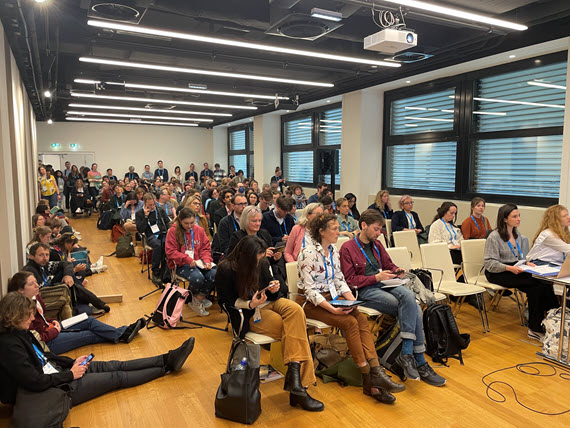 Image: Room 1.34 at VIC for session EOS1.8 (courtesy of Arianna Acierno)
Image: Room 1.34 at VIC for session EOS1.8 (courtesy of Arianna Acierno)
The session was chaired by Arianna Acierno from the Euro-Mediterrenean Centre on Climate Change (CMCC) and Marjana Brkic and included the following abstracts:
- Unseen heat, a story about the potential heat extremes in the Netherlands, Lisette Klok about "unseen heat".
- Design as a participatory foundation for impactful climate communications, Morelli Angela about the need for professional designers to create impactful climate commes as was done for example for the latest IPCC-reports
- Bridging disciplines, shaping futures: the power of networking for climate change communication, Ottavia Carlon about the CMCC Climate Change Communication Award “Rebecca Ballestra” which is also a means to build a global platform of projects
- Climate Disasters and Postcolonial Narratives: Mapping India’s Water Crisis in the Contemporary Indian Graphic Novels, Nobonita Rakshit abouta graphic novel depicting India's water crisis and climate disasters
- Climate Narratives: Empowering Voices for a Sustainable Future, Gaura Naithani about the European Journalism Centre (EJC) which was established to help bridge the gap between scientists and the public
- How to make droughts newsworthy: lessons from the 2022/2023 snow deficit in the Italian Alps, Francesco Avanzi about a Cimafoundation project to connect the snow deficit in the Italian Apls ("snow droughts") with water scarcity in the rest of the year
- “Narrating the climate crisis” – an experiment in the form of a series of conversations, Elisa Vanin about a series of climate conversations in a library in Turine
- GeoTraductores: one translation at a time, Sofía Barragán-Montilla about a volunteer-based project involving Eos.org, GeoLatinas, and Planeteando. It aims to overcome the language barrier in climate change and Earth science communication within Spanish-speaking communities.
- Graz Climate Change Indicators: A data portal backing climate narratives towards reaching the Paris climate goals, Gottfried Kirchengast about recently opened data portal termed Graz Climate Change Indicators (GCCI)
After the coffee break the session commenced with the second half of the presentations:
- Justice and urban transformation in light of accelerating climate change, Karsten Haustein about questions related to current and future mobility in urban areas
- Writing the Earth: what happens when you bring creative writers and geoscientists together to explore climate and sustainability issues?, Fergus McAuliffe about a pairing scheme for scientists and writers and the creative output created
- Resources to give facts a fighting chance against misinformation, see below
- A Digital Academy against Climate Change Disinformation featuring trustworthy and fact-checked information and resources on climate change and media literacy, Spyridoula Markou about an upcoming online platform to provide information and resources about climate change as port of the Agora Project.
- Misinformation in scientific news in Bulgarian for future inoculation, Ruslana Margova about the problem to get Bulgarians interested in scientific or climate topics at all
- We Are the Possible: New Narratives Connecting Science, Health, Education and the Arts, Cecilia Manosa Nyblon and Sally Flint about the Green Futures project of the University of Exeter involving co-creation workshops between scientists, health professionals, educators, youth leaders, translators, writers and artists.
- Surfing the Climate Wave: Laura and Joan's Expedition in the Delta, Anna Boqué-Ciurana about turning her thesis into a childrens' book about the Ebro delta.
- Environmental education and correct scientific information on climate change and natural issues: the case of Lombardy Foundation for the Environment, Simone Picco about the Lombardy Foundation for the Environment which promote regional Environmental Education initiatives
- AI-Enhanced Academic Entrepreneurship in K-12 Climate Education in China, Xiuli Chen (joining virtually from China) about establishing possible strategies that can be used in order to increase the number of people especially in K-12 education who are involved in climatology.
One abstract had been withdrawn, so my slot to present came a bit earlier than planned but went pretty well as far as I can tell. In Resources to give facts a fighting chance against misinformation I briefly introduced participants to Skeptical Science, mentioned our rebuttals updates factory and the quick debunking of "Climate the Movie" before mentioning the Debunking Handbook, the Conspiracy Theory handbook, the FLICC taxonomy of science denial techniques and how to learn about them with the help of the Cranky Uncle game. Sounds like a lot? Yes, but it all fits within the 8 minutes, if only barely! My final presentation is available here or by clicking on this composite image (which is from the drafted version):
And with that, the 2nd day of EGU24 came to a close!
Wednesday April 17
Wednesday was a rather interesting day for me. It started at 8:30 with Union Symposia (US6) Misunderstanding or malice? Getting to the bottom of geoscience disinformation and much to my surprise I had been invited to be one of the panelists for this almost 2 hour long session. This was obviously a first for me, but (I think) it worked out well, in no small part due to the conveners being well aware of my background. This Union Symposia was convended by Flora Maria Brocza with Chloe Hill, Viktor J. Bruckman, Kirsten v. Elverfeldt and Christina West as co-conveners. Apart from myself, speakers for the session were Gaura Naithani (Project Manager & Researcher, European Journalism Centre) and Simon Clark (Science communicator & author).
Here is the description for the symposia:
The spread of false and misleading information can erode trust in public institutions, governments, and the scientific community. It fosters polarisation, disrupts informed decision-making, obstructs constructive dialogue, and subsequently poses a threat to social cohesion and democracy. As researchers, we stand in the eye of the storm. As professional “knowledge generators”, we produce and evaluate facts and should be well-equipped to debunk information we read elsewhere. At the same time, we may not be as well equipped as we think and our research may be taken out of context, with single facts inserted into a wider misleading narrative.
During this Union Symposium, an expert panel will outline what mis- and disinformation is, how it is created and spread in the digital age, why false experts gain traction and how they intentionally misrepresent scientific research, and how the dissemination of doubt and denial can undermine public trust, influence policy decisions, and impact society as a whole. The session will also discuss the role and responsibility of the scientific community in managing and preventing the spread of misinformation as well as the other tools that exist to deal with it.
After a short introduction of the session by Chloe Hill, Kirsten von Elverfeldt got things moving with introducing me as the first panelist. Together with the conveners for the panel session, we had decided that I'd give a quick introduction to science denial, misinformation, the dangers it poses, and how to inoculate people against the techniques used in science denial (click the link for the PDF-version or here for the notes version).
So, I was able to talk about the "stuff" I'm familiar and quite comfortable with, including at least some of the items mentioned in the presentation for EOS1.8 (see above) or other comparable presentation I already did at EGU and/or elserwhere. For whatever reason, I was much more relaxed than I expected to be and got through my presentation just fine. Chloe then had this follow-up question for me:
"What role does Skeptical Science play in helping prevent the spread of misinformation?"
Which I answered along these lines:
Based on feedback and "referrals" we get from scientists and others, our repository of rebuttals to climate myths is helpful to them as they can easily point others to our website instead of having to rebut the claims repeatedly themselves. As "Brandolini's Law" comes into play here, which states that "the amount of energy needed to refute bullshit is an order of magnitude bigger than that needed to produce it." I also mentioned the multi-lingual content we offer thanks to volunteer translation efforts, which - hopefully - helps increase our reach across the globe.
Next to speak was Gaura Naithani who is the Project Manager & Researcher for the European Journalism Centre (EJC). Gaura is a former multimedia journalist from India, who now works “with journalists” across Europe to support and develop relevant grants and training programmes. She is particularly focusing on social media platforms that have changed the way we produce and consume news. This year, she will also be leading the News Impact Summit for the European Journalism Centre with an emphasis on mis/dis info around climate. Gaura shared why the EJC developed a practical online and offline training programme for independent creators (journalists, climate scientists, activists,etc) to support them in elevating their climate journalism. Her opening presentation focused on:
- The need for cross-sectoral collaboration to communicate climate science creatively
- The role social media platforms are playing
- How the training programme equipped participants to identify misinformation
- Whether programmes like these are a potential solution
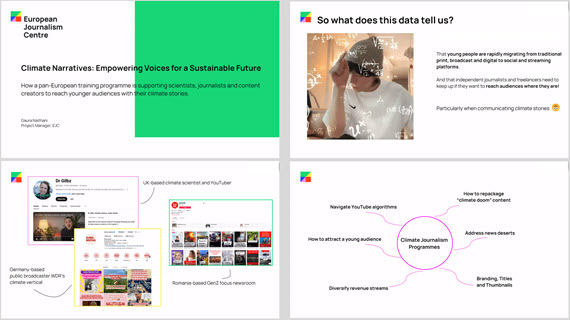
Last but certainly not least, Simon Clark gave his introductory remarks. He is an award-winning science communicator and author from Bath, UK. He holds a PhD in atmospheric physics from the University of Exeter, and in 2023 was made an Honorary Industrial Fellow of the University of Bristol. Since 2017 he has worked as a full-time science communicator, specialising in creating online videos discussing aspects of the climate crisis which have been viewed over 50 million times (check his YouTube channel). He also hosts the How To Make A Science Video podcast, published an introductory book to atmospheric science, Firmame. Simon talked about his experience creating science videos on Youtube, how he comes up with a story line (something he explained in more details in short course SC3.3 on Monday) and how he sometimes creates a bit of a "trap" for climate science deniers with provocative video titles and images.
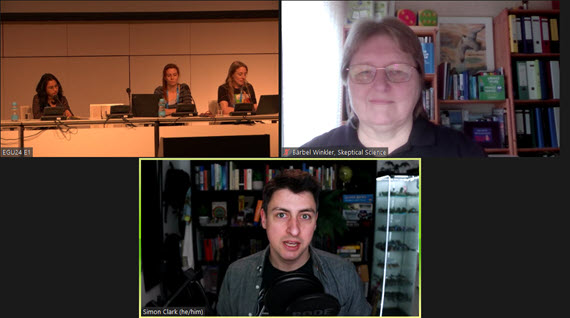
After our introductory remarks, we got into the questions and answers part, where the first questions came from Chloe and Kirsten followed by questions from the audience. We touched on topics like how best to go about science-denying comments on our content, be it Youtube videos in Simon's case or on Skeptical Science content like our blog posts and rebuttals. Quite a bit of our discussion focused on various social media platforms and their options for moderation and if this can somehow be transferred to the "real world". Some questions circled around AI-tools and chat bots and whether they could be more employed for good or bad (with a reminder from Kirsten that they require a lot of energy to run, so tend to have a negative climate impact just based on that). All in all it was a very far-ranging discussion during which we all had ample opportunity to chime in with our answers and thoughts. Should a recording become available, I may add some more details about this Union Symposia in due course. For now, let me end with a sincere Thank You to the conveners of the session for giving me the opportunity to be on this panel!
Over the "lunch-break" I listened to Stefan Rahmstorf's Alfred Wegener Medal Lecture (MAL2) titled "Is the Atlantic Overturning Circulation approaching a tipping point?":
The Atlantic Meridional Overturning Circulation (AMOC) has a major impact on climate, not just around the northern Atlantic but globally. Paleoclimatic data show that it has been rather unstable in the past, leading to some of the most dramatic and abrupt climate shifts known.
These instabilities are due to two different types of tipping points, linked to amplifying feedbacks in the large-scale salt transport and in the convective mixing which drives the flow. Of particular concern is the evidence for an ongoing weakening of the AMOC: it likely is already at its weakest in a millennium.
These tipping points present a major risk of abrupt ocean circulation and climate shifts as we push our planet further out of the stable Holocene climate into uncharted waters. The lecture will discuss the paleoclimatic data, the instability mechanisms, the evidence for an AMOC slowdown and how close we may be to a dangerous tipping point.
Stefan Rahmstorf covered the long history of his research into all things AMOC which he also wrote about in a recently published article in Oceanography: Is the Atlantic Overturning Circulation approaching a tipping point?
In the afternoon, I joined short course (SC2.10) From Misunderstanding to Malice: Countering Mis- and Disinformation which was closely related to US6 in the morning. The course was convenced by Kirsten v. Elverfeldt with Flora Maria Brocza, Maida Salkanovic, Chloe Hill and Simon Clark as co-conveners.
The research we conduct doesn’t fall into a vacuum. Once published, it enters a large information ecosystem, where we hope that our findings will resonate. As researchers, we devote our whole careers to the study of a narrow field of knowledge. This devotion is not shared by other players in this ecosystem who engage with our research, which might lead to misunderstandings and thus unintentional misinformation. Even others in the ecosystem intentionally seek to spread false information or foster ideologically driven disinformation campaigns. Thus, the players in the ecosystem range from fellow scientists from the same or other disciplines, journalists, politicians, social media influencers, the general public, to troll farms. Clearly, not all of them have or seek an in-depth understanding of the scientific context in which a particular piece of information slots into, and some merely seek to generate attention or outrage with their writing.
Many scientists feel somewhat uneasy in this ecosystem - lacking the tools to engage meaningfully. For example, when talking to journalists, information on the uncertainty of data may not be conveyed for the sake of clear and easy-to-follow storylines. Facts may be simplified or even misrepresented, which might lead to a certain reluctance of scientists to talk to journalists. However, especially this type of direct science-media-interaction is crucial for the debunking of mis- and disinformation.
Chloe Hill and Kirsten von Elverfeldt kicked of the short course with short presentations about mis- and disinformation. Chloe laid the foundation with explaining the differences between mis- and disinformation, followed by Kirsten giving us some examples of the different "dummy arguments", also known as logical fallacies:
In the late afternoon - starting at 16:15 - I joined the first part of Education and Outreach session (EOS1.1) Science and Society: Science Communication Practice, Research, and Reflection. Based on previous years' experiences I had fairly high expectations that this would be another chance to learn about several interesting projects related to science communication. I wasn't disappointed! The session was convended by Solmaz Mohadjer and Roberta Bellini, Francesco Avanzi, Usha Harris and Maria Vittoria Gargiulo as co-conveners.
Science communication includes the efforts of natural, physical and social scientists, communications professionals, and teams that communicate the process and values of science and scientific findings to non-specialist audiences outside of formal educational settings. The goals of science communication can include enhanced dialogue, understanding, awareness, enthusiasm, improving decision making, or influencing behaviors. Channels can include in-person interaction, online, social media, mass media, or other methods. This session invites presentations by individuals and teams on science communication practice, research, and reflection, addressing questions like: What kind of communication efforts are you engaging in and how you are doing it? How is social science informing understandings of audiences, strategies, or effects? What are lessons learned from long-term communication efforts?
Here is the list of abstracts presented in the session:
- Decolonizing geoscience communication: a case study of a new human evolution exhibition at the Iziko South African Museum, Robyn Pickering providing examples of how museum exhibits can be de-colonialized
- Actively engaging people on rainfall (or any geoscience topic) through short interactive food related activitie, Auguste Gires about a project where for example the measured amount of local rainfall is put into perspective with amount of a liquid in a glass
- We need new generations of people who know about the Earth – what are we doing about It … in Ireland?, Siobhán Power about how to get the next generation in Ireland interested to learn about the Earth
- "Up-Goer Five Challenge": A way to make science more accessible?, Philipp Aglas-Leitner trying to answer his own question with a "maybe if some parameters are perhaps a bit relaxed so that more than just the 1000 most common words in a language can be used. Otherwise, even simple words like "cloud" (which comes in as word #1255 IIRC) need to be para-phrased which doesn't help with understanding
- uniWeather™: Advancing real-time outreach in urban environmental sciences through app and platform, Gregor Feigel about the uniWeather app developed at the University of Freiburg
- Youth education and empowerment through outdoor experiential learning and peer-to-peer communication, Jane Walden and Léa Rodari about the "Girls on Ice" project to give girls a chance to experience science first hand on expeditions, in school workshops or day excursions under the guidance of female scientists
- The role of leadership in education as a decisive factor for the Communication of Sciences: The case of the European project Connect (Horizon2020), Emmanouil Kartsonakis about the European program Horizon2000 "Connect"
- Know before you act. Effective risk education (should) starts from knowing gaps and preconceptions. A case study on sea level rise, Stefano Solarino about a survey to judge knowledge about sea-level-rise in the Mediterranean region
And with that, another exciting day came to a close!
Thursday April 18
The morning was taken up with the second and third parts of Education and Outreach session (EOS1.1) Science and Society: Science Communication Practice, Research, and Reflection (see above for description).
Abstracts in the 2nd part had climate change as the common thread:
- Climate Change: Communicating What We Don’t Know, David Stainforth about his book "Predicting our Climate future" and why talking about fuutre climate change is different than talking about climate of the past
- Communicating the KNMI’23 Climate Scenarios for the Dutch Caribbean, Iris Keizer from the Dutch Met-office talking about a project to make climate reports relatable for people in Dutch overseas territories
- How to make climate communication more accessible to more communities? Results from a case study featuring KNMI, Björk Johannes about how we can make science communication more accessible by understanding social and cultural context, co-creating, being creativ and a lot more!
- Remote sensing as a tool for science education and engagement: the case of the All-Ukrainian competition "Ecoview", Svitlana Babiichuk about remote sensing gets used by Ukranian school children to discover the world around them and how it changes
- Hilfswerk International: An NGO in Central Asia as Science Communicator between the Society, Governments and the Private Business Sector, Gisela Domej about a project by Hilfswerk Austria in central Asia to build a bridge between stakeholders when it comes to natural hazards
- Climate and Media: an efficient and original training for journalists, Gilles Ramstein about an in-depth online journalism course on climate change in France
- Existential Threat: How Scientists Can Work With The Media To Communicate Complex Systemic Crises, Gaia Vince giving her Angela Croome Award lecture about how stories about scientific research have to be restructured to fit the inverted sequence of stories in the media
Abstracts in the 3rd part focused on geoscience-related projects:
- Science communication and the law: Lessons learned from being an expert witness, Michael Slattery about his experiences as an expert witness and why it's necessary to simplify complex concepts and communicate them effectively
- Creating safety through media narratives: A framework for investigating potential biases in describing adverse complex phenomena, Marina Mantini presenting on behalf of the first author Martina Ivaldi about a media analysis related to the floods in the Marche region of Italy in September 2023
- Using mental models as a tool to understand perspectives of scientific uncertainty and effectively communicate natural hazards science advice, Emma Hudson-Doyle about how we understand uncertainty differently and why there are different sources of uncertainty if you ask different groups of people
- Supporting Children’s Space Careers Education: “I’m a Space Person”, Cara Waters about a UK-project to get pupils interested in many diffrent topics which can lead to a career in the space industry
- Connecting worlds: Mutual benefits of teacher–researcher interaction, Rory Selby-Smith about trying to reverse the trend of ever fewer geoscience students in Ireland
- Filipino youth-led place-based geoducation through knowledge sharing between young professionals and residents : the Nomad Projects OpenEdu workshops , Paula Naomi Irapta about a co-created arts projects in The Philippines
- Reclaiming the rocks: ukuthetha ngezifundo zomhlaba ngesiXhosa, Sinelethu Hashibi giving her Katia and Maurice Krafft Award Lecture about translating geological terms into her native isiXhosa language in the Eastern Cape of South Africa.
In the afternoon it was time for short course (SC3.2) Elevate your Pitch: Developing Engaging Short Scientific Presentations. This turned out to be a very lively, interesting, helpful and fun short course! Topics covered included:
- Structuring a killer elevator pitch – learning from 1/2/3-min examples
- Knowing your audience – harnessing the power of tailored openings/closings
- Captivating delivery – leveraging body language to your advantage
- Harnessing creativity - choosing the right medium
- Enunciating to engage – communicating across borders
- Effectively practising your pitch – making the best of your time
The course included some hands-on practice to write and deliver a 1-minute pitch about a (research) project which virtual participants could do on the "rooftop" in Gather.town if they wanted to. I quickly cobbled together this pitch about a certain Cranky Uncle:
Being a science communicator, I don't do any research but I can tell you about a neat project I'm involved with. So, here goes: What's the best way to understand the science denial arguments from your cranky uncle? From a Cranky Uncle as your mentor, of course! And that's what the Cranky Uncle game provides! Cranky Uncle teaches you the techniques he uses to deny science and then you practice with the help of cartoon quizzes to identify them quickly.
I delivered that to fellow virtual participant Milo and he plans to download the game - so the pitch was apparently successful! Once the Zoom-session resumed I was also able to give the pitch to the room, so a very successful application of a hybrid meeting!
The final session for me on Thursday was the Education and Outreach session (EOS4.1) Science Policy Interface: Shaping Debates and building bridges. I picked this for two reasons: it was another repeat for me and earlier sessions had been interesting. And, it's a session in the fun - if somewhat hectic - PICO format, with a whirlwiind of 2-minute "long" pitches followed by longer discussions with abstract authors at their onsite or virtual screens. The session was convened by Marie Heidenreich with Susann Birnstengel, Giorgia StasiECS, Chloe Hill and Maria Vittoria Gargiulo as co-conveners.
Scientific knowledge is crucial for shaping policies related to climate, environment, sustainability, and resources. To have an impact on politics, research needs to communicate in a way that addresses needs and offers solutions. However, it is important to identify the most effective science policy formats that can contribute to enriching political debates. While there are now many resources available to scientists who would like to engage in the policymaking process, finding specific information or practical examples that relate to a specific discipline or field of research can be challenging.
This session aims to bridge that gap by highlighting success stories from scientists who have engaged in policy and made critical societal impacts – either on a European, national, or local level – across different scientific disciplines and science officers who have facilitated successful science-policy-dialogues. It will also aim to examine the various challenges that researchers face when engaging on the science-policy interface and various strategies that others have taken to manage and overcome them.
As expected, a big range of institutions, activities and projects trying to bridge the gap between science and policy were introduced. We heard about projects funded by the European Research Council (ERC), about Helmoltz scientists meeting members of the European Parliament (EEmeetsEP), about the Leopoldina’s perspective on community and policy advice, about the Parliamentary Evening, about bridging the gap between scientists and policymakers, about connecting geothermal energy research and policy in Ireland, and about Reflecting on the role of science advice in the climate crisis to name just a few of the pitches delivered within about 40 minutes.
Friday, April 19
I had a "late start" to the day on Friday with Great Debate (GDB8) about Artificial Intelligence in scientific publishing: blessing or bane? This turned out to be a lot more interesting than I had thought it would be.
Technological developments have always had an impact on the evolution of scientific publishing, transitioning from ink and paper to its current electronic format. In this context, Artificial Intelligence (AI) has made its way to the process of publishing research results.
The advent of Large Language Models (LLM) which are capable of generating various types of textual content, raised concerns within the scientific community with regards to presenting research output. This new technological revolution is developing at a fast pace, with possibly significant consequences for scientific publications.
The rise of generative Artificial Intelligence (AI) tools, including Large Language Models (LLM), presents both challenges and opportunities for scientific publishing. How can we use these tools responsibly and effectively?
The discussion will explore several aspects of the topic, including:
- Best practices in employing AI tools for scientific writing
- The potential of AI to assist in the peer review process
- Responsibilities and ethical considerations for authors, reviewers, editors and publishers
The panel discussion among the participants (Fernanda Matos, PhD candidate, Alfred Wegener Institute, Helmholtz Centre for Polar and Marine Research (AWI), Germany / Marie Soulière, Head of Publication Ethics and Quality Assurance, Frontiers, Switzerland / Tina Treude, Professor, University of California Los Angeles (UCLA) and Executive Editor, EGU Journals (Biogeosciences), USA / Tony Ross-Hellauer, Senior Researcher, Graz University of Technology and Know-Center GmbH, Austria) focused on scientific publishing, what AI can and shouldn't be used for and how guidelines for its ethical use are needed. This however can also at least to some extent be applied to what we write for Skeptical Science. Just to give a simple example: I've been using deepl.com fairly regularly to create a first draft of a German translation which is a big time saver as it helps to get the wording and sentence structure right. The recording of this far ranging great debate will eventually be available on Youtube and I'll embed it here as soon as this happened. In the meantime, here is a composite image for both debates:
In the afternoon, the Great Debate (GDB6) If informing is not enough, how should scientists engage to accelerate the social transformation required by climate change and biodiversity collapse? was my last session for this year's EGU conference.
Numerous geoscientists are producing and disseminating knowledge about climate change and contemporary environmental degradation to increasingly wider audiences, from civil society to policymakers. This knowledge is notably gathered in alarming reports by scientific institutions such as the Intergovernmental Panel on Climate Change (IPCC) or the Intergovernmental Science-Policy Platform on Biodiversity and Ecosystem Services (IPBES) and it indicates that rapid and radical transformations of our societies are simply vital.
Still, ongoing efforts to trigger such transformations, whether by political, economic, or civil society stakeholders, often fall short of the urgent actions recommended. It has increasingly been suggested that putting most efforts into ever-improving knowledge and communication is a strategy that can only address part of the obvious gap between Science and the required societal change (see review articles by Stoddard et al., 2021 and Oreskes, 2022).
This great debate was convened by Odin Marc, Marthe Wens and Riccardo Riva and featured Sonia Seneviratne (ETH Zurich, Switzerland), Julia Steinberger (Lausanne, Switzerland), Augustin Fragnière (University of Lausanne, Switzerland) and Oscar Berglund (Bristol, United Kingdom). The engaged discussion included pros and cons of scientists getting involved in protests and how effective - or not - they are.
Final thoughts
As expected, EGU24 was another intense week for me following many sessions virtually. Overall, the hybrid format worked pretty well for me from the relative comfort of my office at home. One advantage certainly was the short "commute" each morning from the living room to the "office" and that going from one session to another only involved some virtual "meet hopping" from one Zoom-call to the next. It was also a lot easier to work on this evolving blog post throughout the days instead of cramming most of that "task" into the evenings spent at the hotel in Vienna.
The one thing that I think could be improved for virtual participants is to make better use of the virtual meeting space Gather.town. It could for example be actively promoted during short courses when on-premise participants are working on tasks in groups with having a virtual space there (the Rooftop would bea nice place for that!). In addition virtual pop-up events scheduled for Gather.town could be promoted right there, so that people wandering around with their avatars have a chance to notice and join them.
All in all, the conference provided a lot of food for thought, some new connections and several websites to check out in more detail. And last but not least, I'm really glad that I accepted the "challenge" from Chloe Hill and Kirsten von Elverfeldt to be on the panel of Union Symposia 6 about Misunderstanding or malice? Getting to the bottom of geoscience disinformation! This session certainly turned out to be the highlight of the week for me!
And with that, it's a wrap! I'm already looking forward to what next year's General Assembly of the European Geosciences Union will bring from April 27 to May 2 2025 which I plan to join in Vienna again.































 Arguments
Arguments






















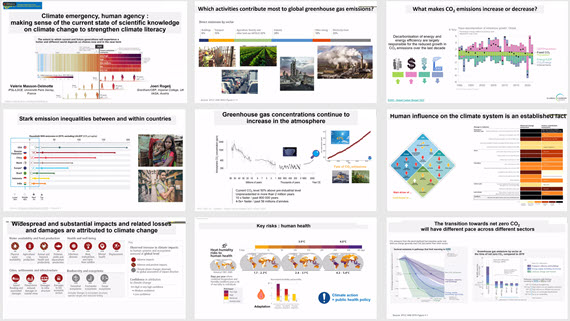
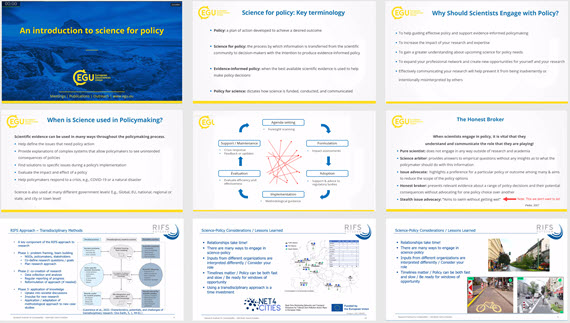
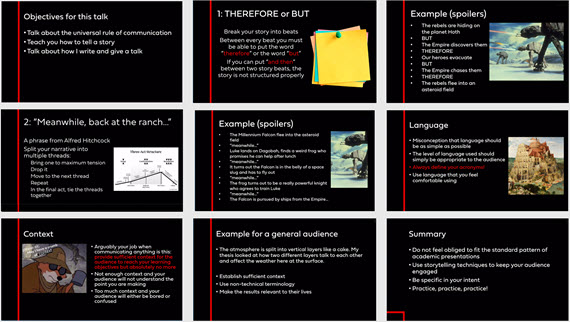
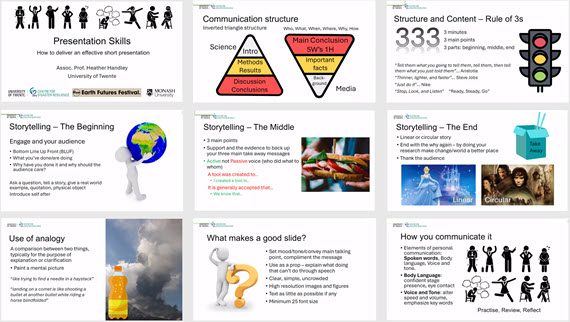
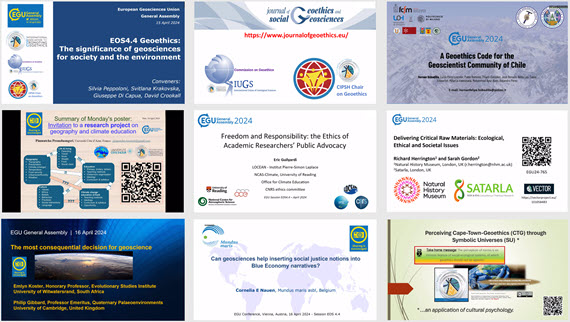
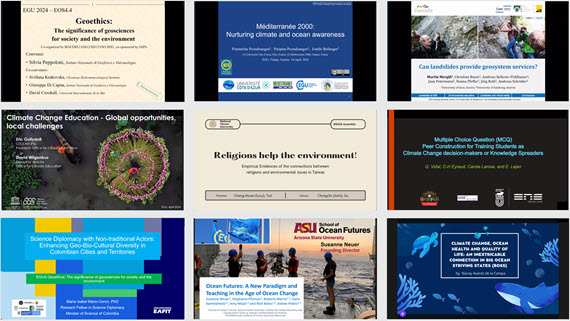
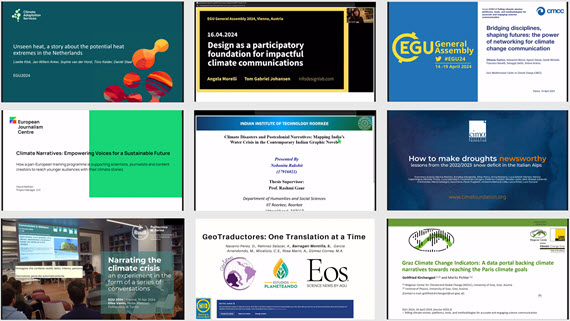
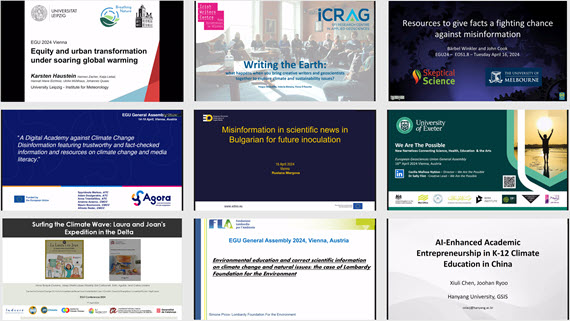
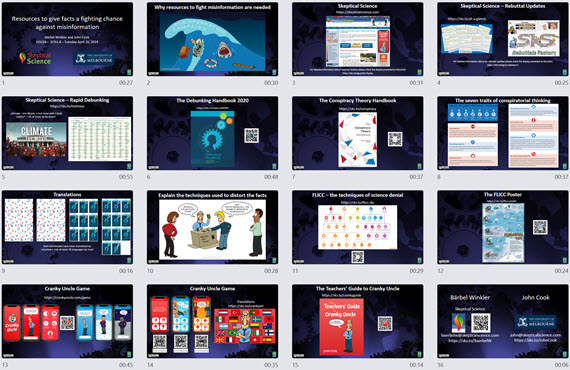
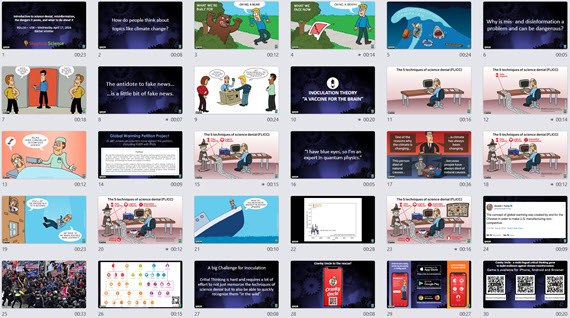
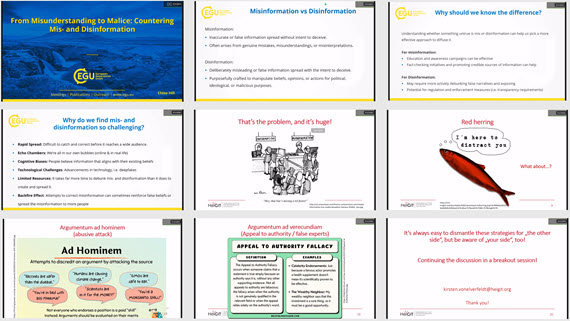
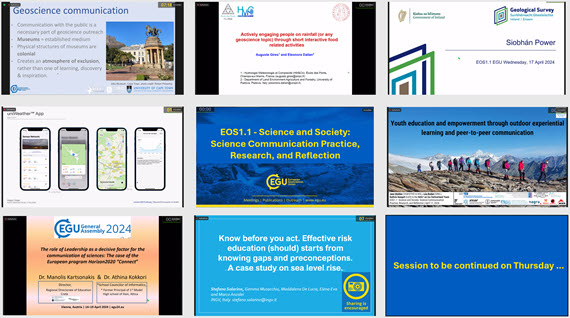
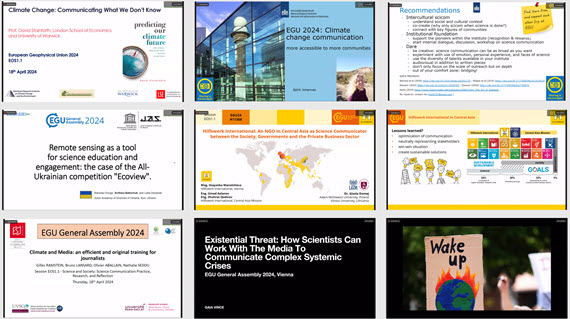
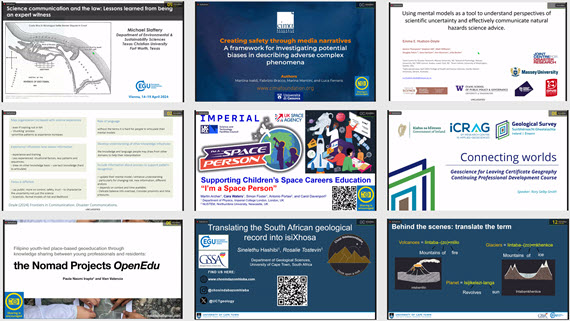
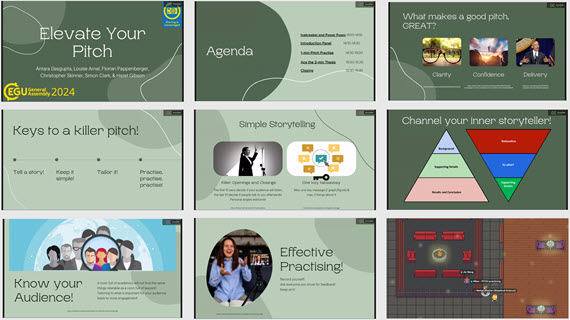
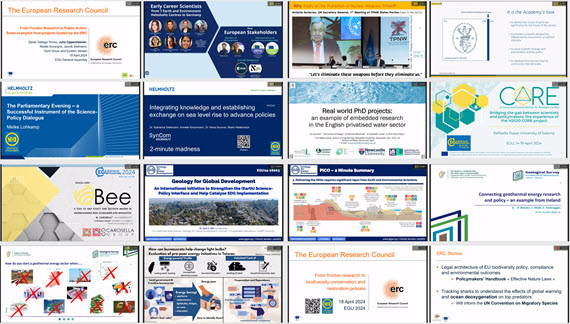
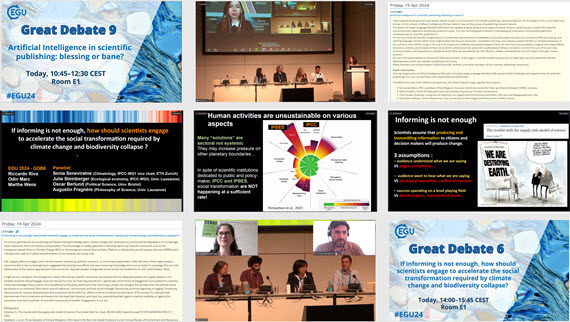
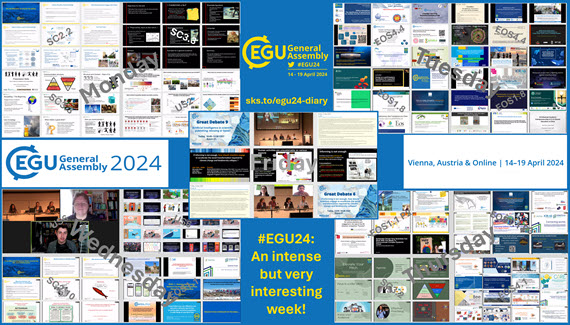









Comments